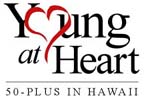

|
Nutrition
Alan Titchenal |

Seniors still need adequate
iron for good health
Aging might gradually decrease strength and endurance, but feeling excessively tired is not an inevitable consequence. Many people over 50 take dietary supplements in hopes of enhancing energy levels, but they could be taking the wrong supplements.During the last couple of decades, most vitamin and mineral supplements targeting the over-50 consumer contain little or no iron. This change in formulation is driven by the controversial theory that iron accumulation in the body is associated with an increased risk of heart disease.
In addition to decreased iron, public health recommendations have steered people away from the most concentrated dietary sources of iron, such as meat. Also, many people are eating primarily vegetarian diets, and iron is less available for absorption from vegetable sources. The RDA for iron in a vegetarian man or post-menopausal woman is 14 milligrams per day, compared with 8 milligrams with a mixed diet. Thus, in attempts to make healthy diet changes, many people are ending up with too little iron.
The risks of iron deficiency are many. Inadequate iron is one of the major causes of anemia. It can also be seriously harmful to the immune system and lead to both cardiovascular and neurological complications. Some specific symptoms of iron deficiency and anemia include decreased work tolerance, increased weakness, decreased tolerance to cold, shortness of breath, dizziness, abnormal EKG, depression, attention or mental concentration problems and edema.
In a recently published Penn State study, researchers found that iron deficiency resulted in impaired levels of immunity in seemingly well-nourished and healthy women over age 60.
Anemia is common in seniors and its prevalence increases with age. This can be due to multiple nutrient deficiencies (iron, B12, folate and protein) or to internal blood losses that slowly drain body iron. Typical causes of blood loss include inflammation of the esophagus, stomach, intestines, ulcers, polyps or cancer. Giving blood too frequently also can result in iron deficiency.
Dr. Douglas Smith of the University of Wisconsin Medical School indicates that anemia should not be accepted as normal. He was able to find causes in approximately 80 percent of the elderly patients he studied.
Because iron deficiency can exist without anemia, it is often undiagnosed through the traditional blood testing of hemoglobin and hematocrit. A full evaluation of iron status includes serum ferritin, serum iron, iron binding capacity and transferrin saturation. Doing these extended blood tests could save thousands of dollars and many invasive medical tests.
To function well in your later years, you need to be proactive about knowing your iron status and ensuring that your diet and supplements provide adequate amounts. If your energy level is dragging, seek medical advice. Despite fears of getting too much iron, getting too little is increasingly common, and the consequences are serious. Striking a balance it what it is all about.
Alan Titchenal, Ph.D., C.N.S., and Joannie Dobbs, Ph.D., C.N.S., are nutritionists in the Department of Human Nutrition, Food and Animal Sciences, College of Tropical Agriculture and Human Resources, University of Hawaii-Manoa. Dr. Dobbs also works with University Health Services. Their column runs Mondays in the Star-Bulletin.
( See the Columnists section for past articles. )